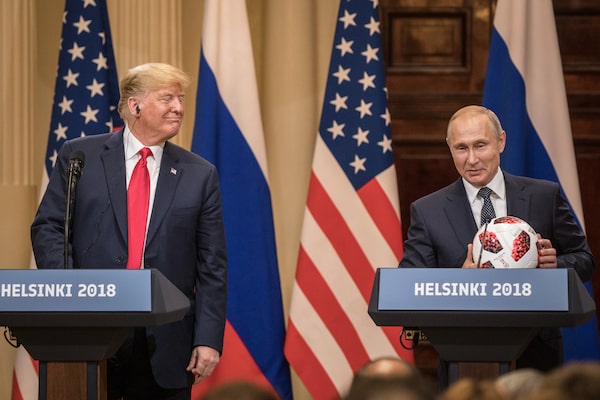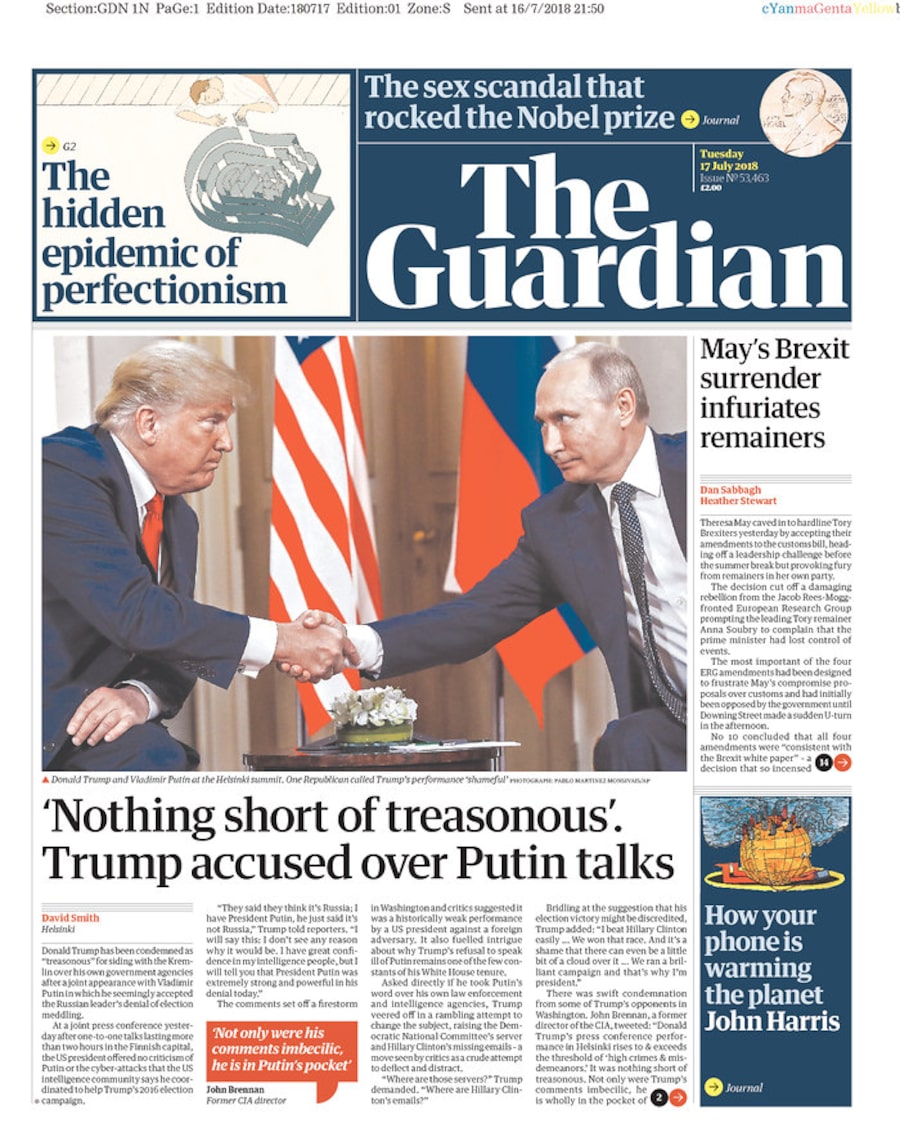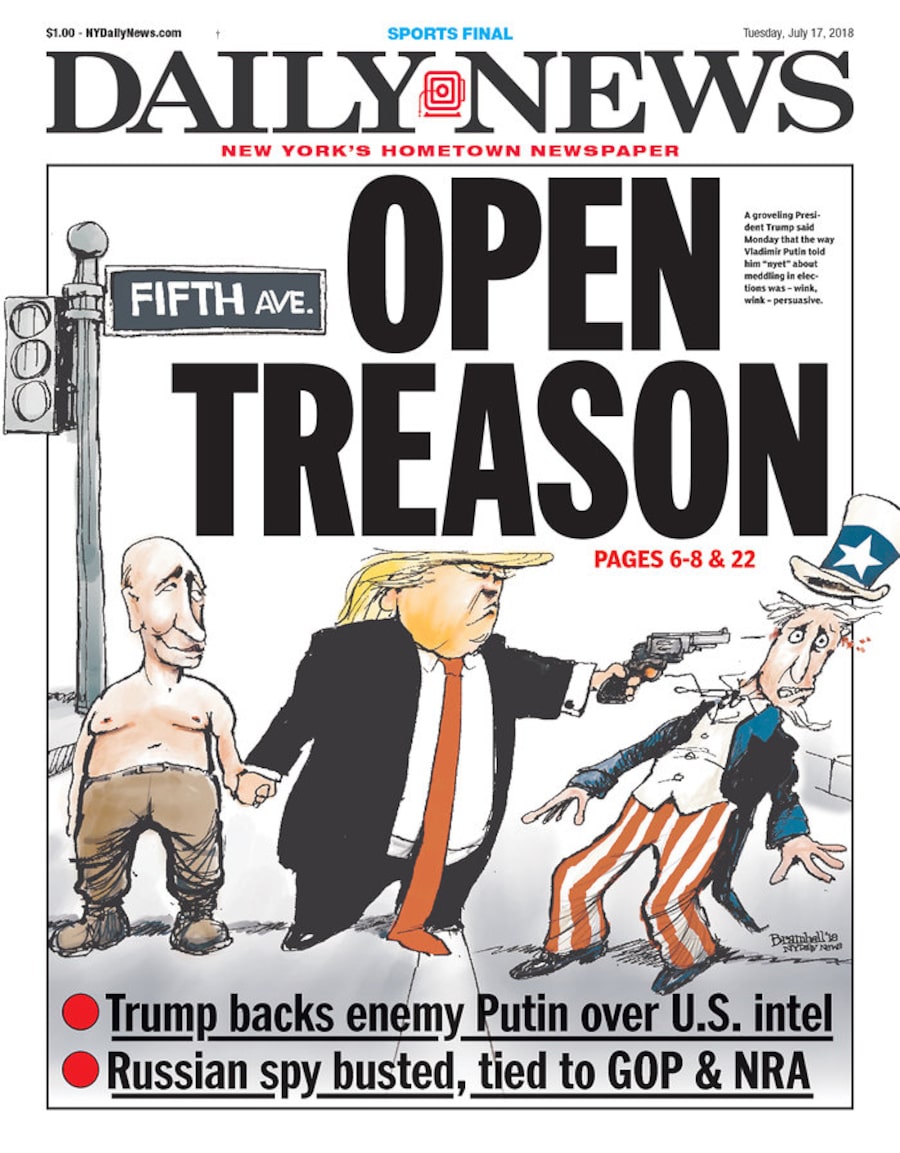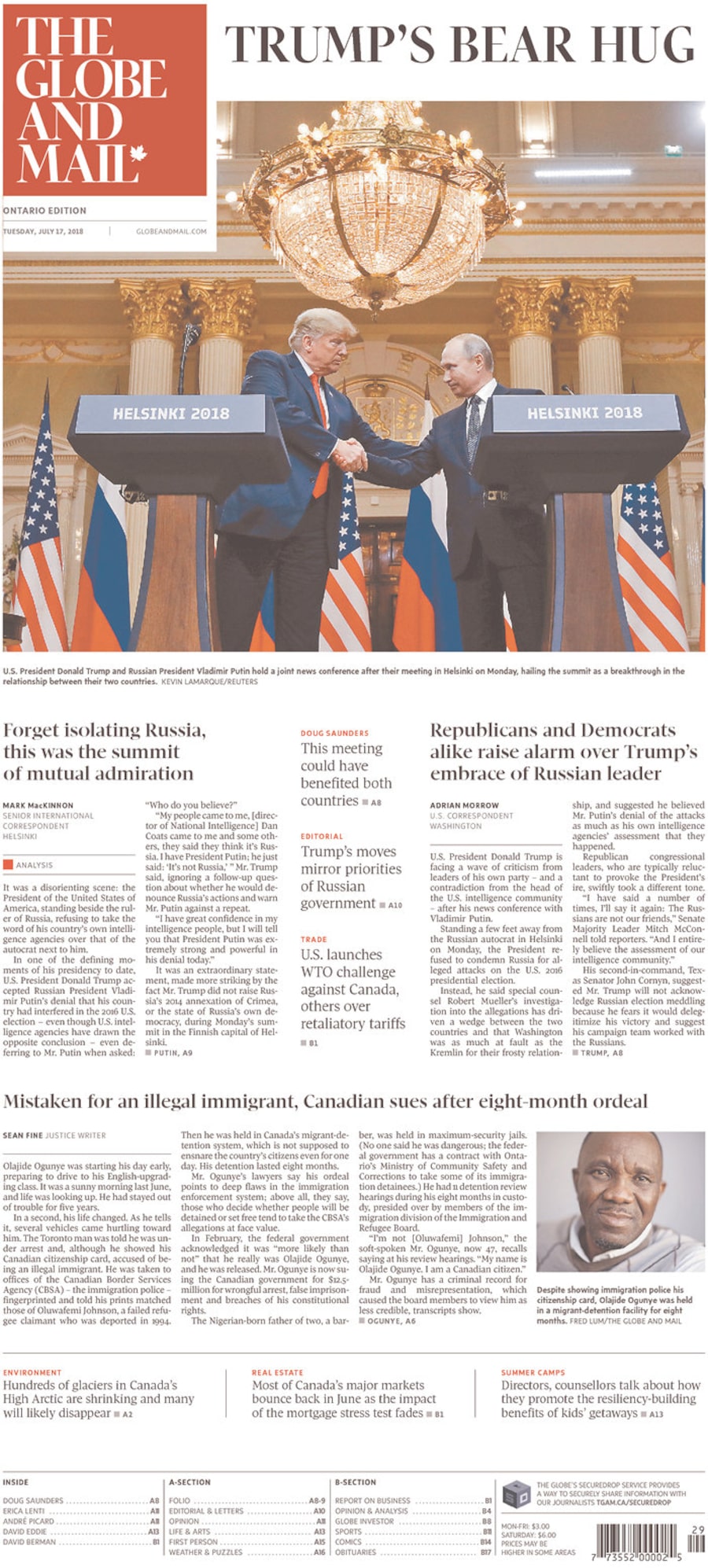
Russian President Vladimir Putin hands U.S. President Donald Trump a World Cup football during a joint press conference after their summit on July 16, 2018 in Helsinki, Finland.Chris McGrath/Getty Images
While U.S. politicians are despondent about the outcome of Donald Trump’s summit meeting with Vladimir Putin, Moscow is celebrating − and the Russian military says it is preparing to act on the “agreements” reached between the two presidents in Helsinki.
Russia’s political and media establishment cheered the outcome of the one-day summit, which Finland’s Kauppalehti newspaper summarized with the simple headline: “Trump 0 - Putin 1.”
While Mr. Trump was facing harsh criticism from across the U.S. political spectrum for the deference he had shown to Mr. Putin in Helsinki, Russian Foreign Minister Sergei Lavrov told reporters that the meeting had gone “fabulous … Better than super.”
Related: Trudeau slams Putin, steers clear of criticizing Trump in wake of Helsinki summit
Related: U.S. Republican leaders enraged after Trump’s performance at conference in Helsinki
Opinion: That was treason, Donald Trump. We all saw it
The official Rossiisskaya Gazeta newspaper trumpeted Helsinki as a turning point in Russia’s relationship with the West that has been in a deep freeze since Moscow’s 2014 annexation of Crimea, which it seized after sending special forces troops into the Ukrainian territory. “The West’s attempts to isolate Russia failed,” read the headline in the state-run paper, referring to the Obama administration’s policy of trying to force Russia to change its behaviour through economic sanctions and a freeze of high-level contacts.
And while Mr. Putin and Mr. Trump ended their meeting without producing any kind of communiqué or other official document outlining what they had achieved, the Russian military seemed to believe that some sort of understanding had been reached. On Tuesday, the Ministry of Defence announced that it stood ready to begin “practical implementation of the agreements in the sphere of international security reached by Russian and U.S. Presidents.”
The statement raises more questions about what was said – and agreed to – during the one-on-one meeting between Mr. Trump and Mr. Putin, which took up more than half of the four-hour summit. The two leaders met alone for two hours and 10 minutes, with only their translators present, before allowing their delegations to join them.
Mr. Putin had a notepad and pen on the table beside him while reporters were present at the start of the private tête-à-tête; Mr. Trump’s side of the table was empty.
Speaking to reporters in Moscow on Tuesday, Russian military spokesman Major-General Igor Konashenkov provided few details about “the agreements.” He said only that the Russian military leadership was ready to “enliven contact” with the U.S. military regarding “co-operation in Syria, and other topical issues of military security.”
Mr. Putin and Mr. Trump both spoke about Syria during their side-by-side press conference at the Presidential Palace in Helsinki, but made no specific announcement. What they did say, however, hinted at an informal pact that might see the Russian military – which has fought alongside the regime of Bashar al-Assad in Syria’s civil war – provide some kind of buffer between the regime forces and the Israeli-controlled Golan Heights.
“President Putin also is helping Israel. And we both spoke with [Israeli Prime Minister] Bibi Netanyahu, and they would like to do certain things with respect to Syria, having to do with the safety of Israel,” Mr. Trump said. “So, in that respect, we absolutely would like to work in order to help Israel. And Israel would be working with us. So both countries would work jointly.”
Israel’s chief concern is preventing Iran or its allies, including Lebanon’s Hezbollah militia, from establishing bases near the frontier in Golan.
In his own Helsinki remarks, Mr. Putin said he wanted to see the restoration of the prewar status quo between Israel and Syria. “This will bring peace to Golan Heights, and bring a more peaceful relationship between Syria and Israel, and also to provide security of the state of Israel,” the Russian leader said.
It was clear from the Helsinki press conference that the United States − which has backed anti-Assad forces since the outbreak of Syria’s civil war in 2011 − is no longer pushing for Mr. Assad’s ouster. “As far as Syria is concerned, the task of establishing peace and reconciliation in this country could be the first showcase example of the successful joint work” between Russia and the U.S., Mr. Putin said.
Maj.-Gen. Konashenkov said that the Russian side also stood ready to discuss the extension of the Strategic Arms Reduction Treaty, or START, which caps the number of nuclear warheads each side can possess at 1,550. The treaty is due to expire in 2021.
Both Mr. Trump and Mr. Putin spoke during the press conference of the importance of curbing nuclear proliferation − and Mr. Putin said the Russian side had proposed extending START − but, as with Syria, no new agreement was announced.
The Russian side’s confidence that some kind of deal was reached in Helsinki − a pact no one else knows the details of − will reinforce nervousness about what took place during the prolonged private conversation between the two presidents.
While reaction in the United States was a mixture of shock and indignation at the deference Mr. Trump showed to the Russian leader − in particular by suggesting the U.S. was to blame for frosty relations between the two countries, and accepting Mr. Putin’s denial that Russia interfered in the 2016 U.S. election − the response in Europe was more fearful in tone.
“And now, as a U.S. ally, we are supposed to believe that if President Putin launches a hybrid war, or even a nuclear strike against Poland, President Donald Trump will threaten to nuke him back,” Radek Sikorski, a former Polish foreign minister, posted on Twitter shortly after the Helsinki summit ended.
Former Swedish prime minister Carl Bildt said that by not pressing Mr. Putin on issues such as Russia’s annexation of Crimea, its intervention in Syria, or its meddling in Western elections, Mr. Trump was effectively giving the Kremlin boss carte blanche to keep behaving in the same manner. “Any reasonable Kremlin interpretation would be that Russia can go on pursuing its policies without significant White House objection,” Mr. Bildt wrote in an editorial for the Washington Post.
Most nervous of all, unsurprisingly, is the government of Ukraine. President Petro Poroshenko, who attended the NATO summit, had been hoping to see Mr. Trump push Mr. Putin for the return of Crimea, and an end to Russia’s support for separatist fighters in the breakaway Donetsk and Lugansk regions of his country.
Mr. Poroshenko got neither, and in the wake of the Helsinki meeting, he too took to social media in what appeared to be an effort to brace his country for yet more turbulence ahead.
Some analysts worried before the summit that − in exchange for Russia’s help in the Middle East − Mr. Trump might give Mr. Putin an informal green light to make further moves in Ukraine.
On Tuesday, Mr. Poroshenko warned that Russian military activity was increasing around Mariupol, a strategic Ukrainian port between separatist-controlled Donetsk and Russian-ruled Crimea.
“We will not tolerate Russian and foreign ships moving towards Ukrainian ports,” Mr. Poroshenko wrote on his Facebook and Twitter accounts. “We are ready to defend our land even if we must do it alone, without international support.”
U.S. President Donald Trump emerged from a meeting with Vladimir Putin on Monday saying he saw no reason to believe Russia had hacked the 2016 U.S. presidential election, and the Russian leader “was extremely strong and powerful” in denying it. Jacob Greaves reports.
Reuters









 Mark MacKinnon
Mark MacKinnon